BULAW 5916 Taxation Law & Practice: Analysis of Cash vs Accrual Basis
VerifiedAdded on 2023/06/08
|8
|2804
|418
Report
AI Summary
This report provides a detailed analysis of whether Frank Lloyd should use the cash or accrual accounting method for his business in 2016/17 and 2017/18, based on Australian taxation law. It examines relevant tax rulings such as the Arthur Murray Principle and Carden Case, and applies them to Frank's specific business circumstances, considering factors like turnover, business operations, and reliance on staff and machinery. The report also discusses the deductibility of various expenses, including repair costs, legal fees, and provisions for future claims, referencing relevant sections of the Income Tax Assessment Act 1997 and case law. Desklib offers a wealth of similar solved assignments and past papers for students.
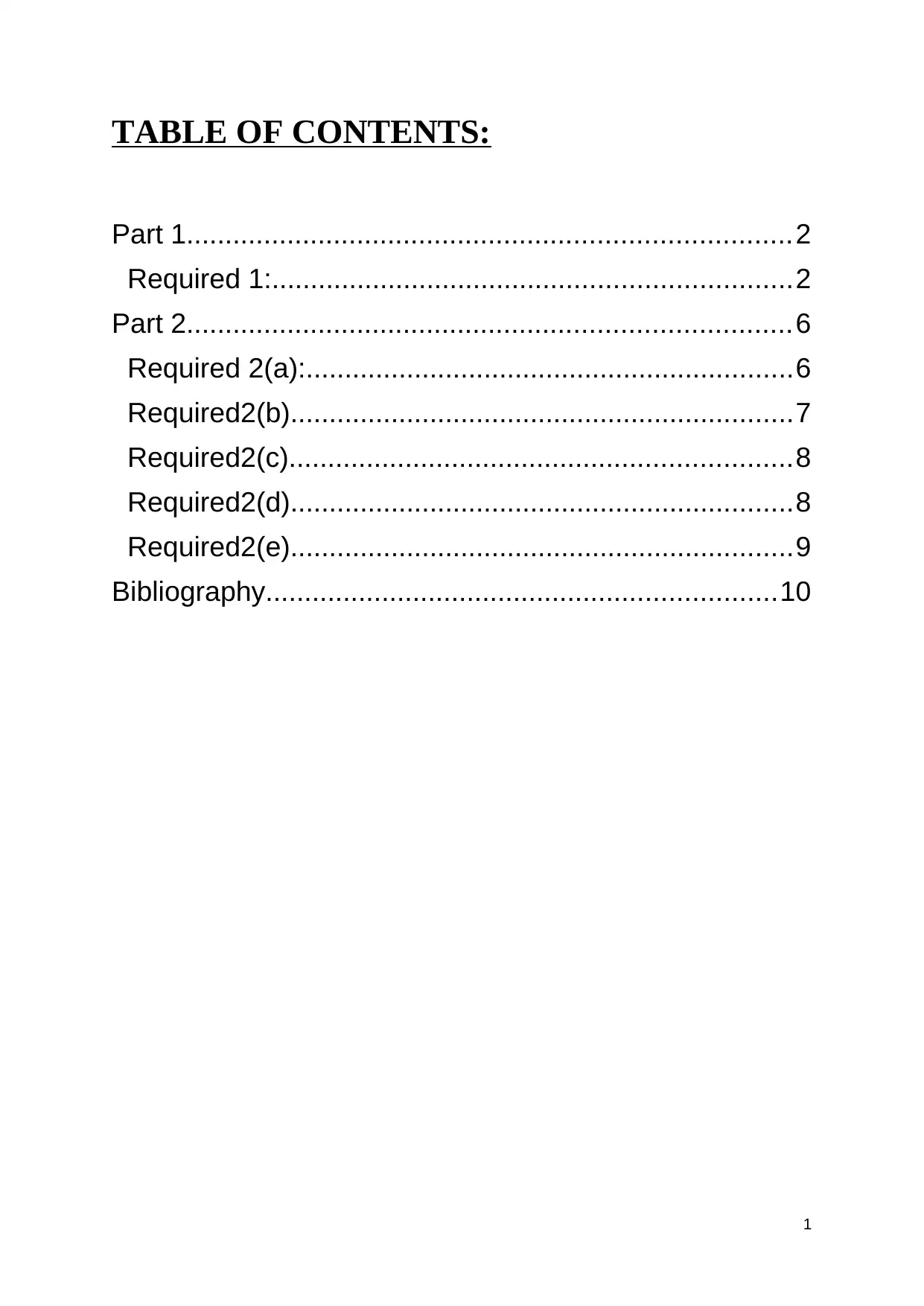
TABLE OF CONTENTS:
Part 1..............................................................................2
Required 1:...................................................................2
Part 2..............................................................................6
Required 2(a):...............................................................6
Required2(b).................................................................7
Required2(c).................................................................8
Required2(d).................................................................8
Required2(e).................................................................9
Bibliography..................................................................10
1
Part 1..............................................................................2
Required 1:...................................................................2
Part 2..............................................................................6
Required 2(a):...............................................................6
Required2(b).................................................................7
Required2(c).................................................................8
Required2(d).................................................................8
Required2(e).................................................................9
Bibliography..................................................................10
1
Paraphrase This Document
Need a fresh take? Get an instant paraphrase of this document with our AI Paraphraser
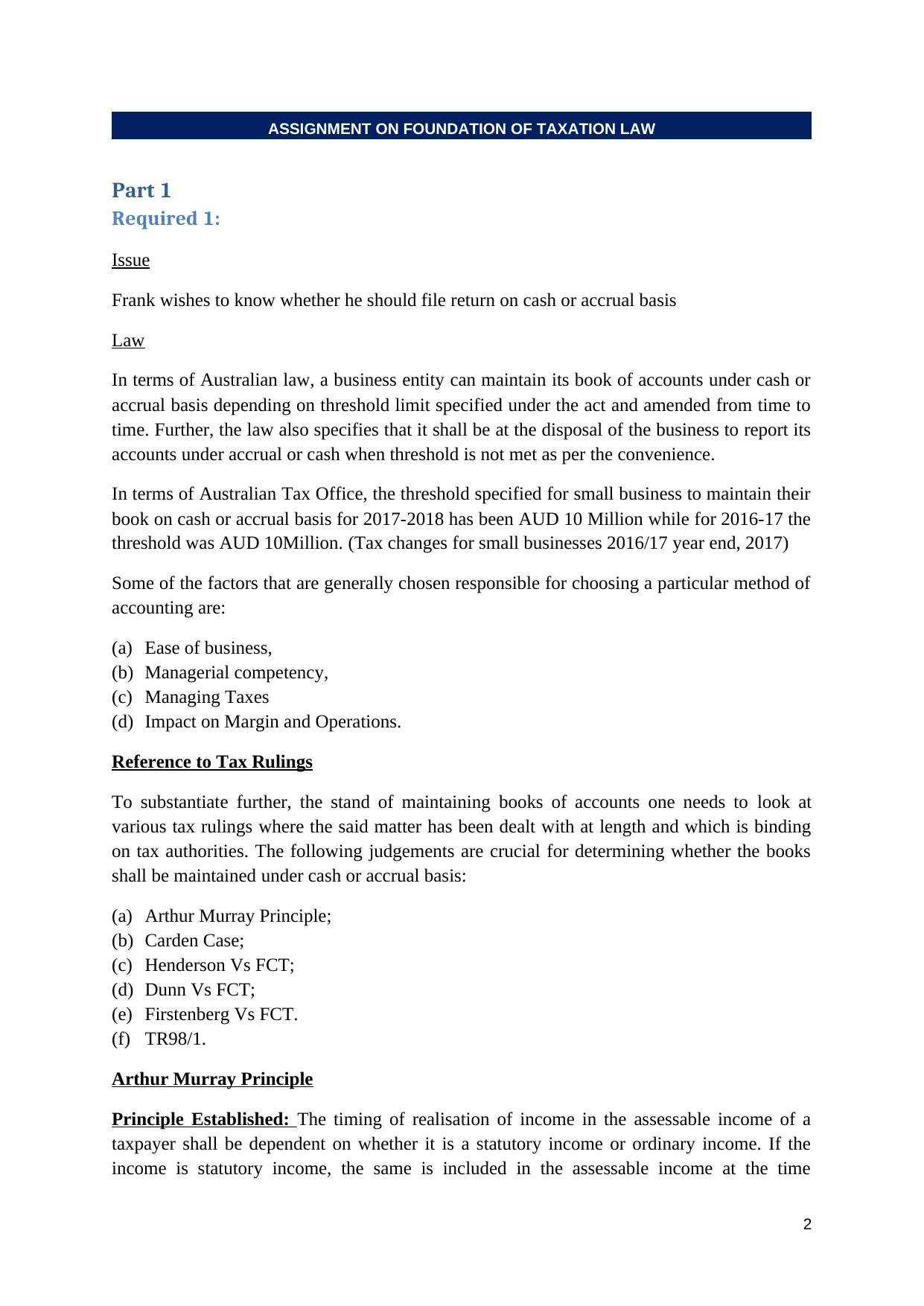
ASSIGNMENT ON FOUNDATION OF TAXATION LAW
Part 1
Required 1:
Issue
Frank wishes to know whether he should file return on cash or accrual basis
Law
In terms of Australian law, a business entity can maintain its book of accounts under cash or
accrual basis depending on threshold limit specified under the act and amended from time to
time. Further, the law also specifies that it shall be at the disposal of the business to report its
accounts under accrual or cash when threshold is not met as per the convenience.
In terms of Australian Tax Office, the threshold specified for small business to maintain their
book on cash or accrual basis for 2017-2018 has been AUD 10 Million while for 2016-17 the
threshold was AUD 10Million. (Tax changes for small businesses 2016/17 year end, 2017)
Some of the factors that are generally chosen responsible for choosing a particular method of
accounting are:
(a) Ease of business,
(b) Managerial competency,
(c) Managing Taxes
(d) Impact on Margin and Operations.
Reference to Tax Rulings
To substantiate further, the stand of maintaining books of accounts one needs to look at
various tax rulings where the said matter has been dealt with at length and which is binding
on tax authorities. The following judgements are crucial for determining whether the books
shall be maintained under cash or accrual basis:
(a) Arthur Murray Principle;
(b) Carden Case;
(c) Henderson Vs FCT;
(d) Dunn Vs FCT;
(e) Firstenberg Vs FCT.
(f) TR98/1.
Arthur Murray Principle
Principle Established: The timing of realisation of income in the assessable income of a
taxpayer shall be dependent on whether it is a statutory income or ordinary income. If the
income is statutory income, the same is included in the assessable income at the time
2
Part 1
Required 1:
Issue
Frank wishes to know whether he should file return on cash or accrual basis
Law
In terms of Australian law, a business entity can maintain its book of accounts under cash or
accrual basis depending on threshold limit specified under the act and amended from time to
time. Further, the law also specifies that it shall be at the disposal of the business to report its
accounts under accrual or cash when threshold is not met as per the convenience.
In terms of Australian Tax Office, the threshold specified for small business to maintain their
book on cash or accrual basis for 2017-2018 has been AUD 10 Million while for 2016-17 the
threshold was AUD 10Million. (Tax changes for small businesses 2016/17 year end, 2017)
Some of the factors that are generally chosen responsible for choosing a particular method of
accounting are:
(a) Ease of business,
(b) Managerial competency,
(c) Managing Taxes
(d) Impact on Margin and Operations.
Reference to Tax Rulings
To substantiate further, the stand of maintaining books of accounts one needs to look at
various tax rulings where the said matter has been dealt with at length and which is binding
on tax authorities. The following judgements are crucial for determining whether the books
shall be maintained under cash or accrual basis:
(a) Arthur Murray Principle;
(b) Carden Case;
(c) Henderson Vs FCT;
(d) Dunn Vs FCT;
(e) Firstenberg Vs FCT.
(f) TR98/1.
Arthur Murray Principle
Principle Established: The timing of realisation of income in the assessable income of a
taxpayer shall be dependent on whether it is a statutory income or ordinary income. If the
income is statutory income, the same is included in the assessable income at the time
2
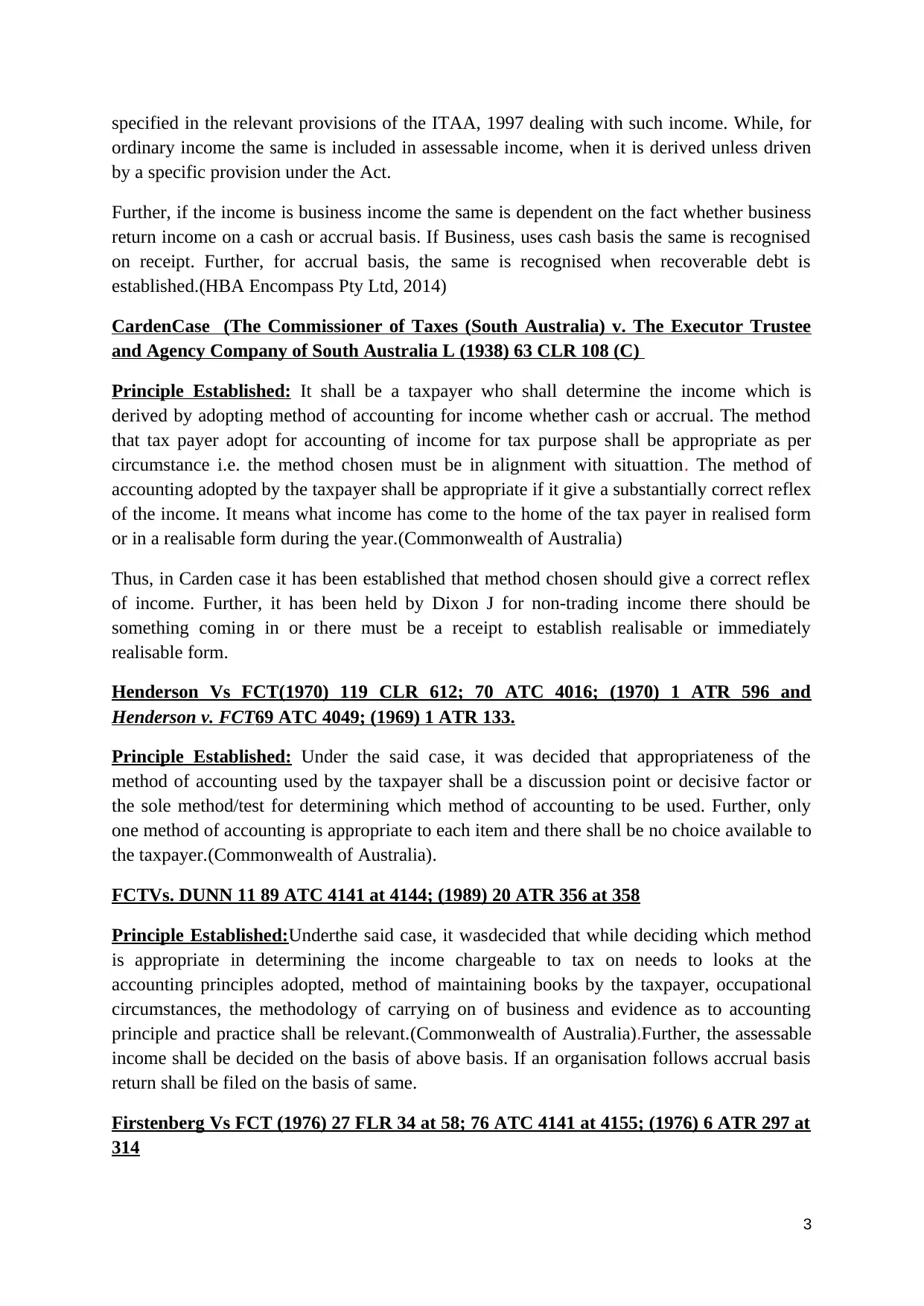
specified in the relevant provisions of the ITAA, 1997 dealing with such income. While, for
ordinary income the same is included in assessable income, when it is derived unless driven
by a specific provision under the Act.
Further, if the income is business income the same is dependent on the fact whether business
return income on a cash or accrual basis. If Business, uses cash basis the same is recognised
on receipt. Further, for accrual basis, the same is recognised when recoverable debt is
established.(HBA Encompass Pty Ltd, 2014)
CardenCase (The Commissioner of Taxes (South Australia) v. The Executor Trustee
and Agency Company of South Australia L (1938) 63 CLR 108 (C)
Principle Established: It shall be a taxpayer who shall determine the income which is
derived by adopting method of accounting for income whether cash or accrual. The method
that tax payer adopt for accounting of income for tax purpose shall be appropriate as per
circumstance i.e. the method chosen must be in alignment with situattion. The method of
accounting adopted by the taxpayer shall be appropriate if it give a substantially correct reflex
of the income. It means what income has come to the home of the tax payer in realised form
or in a realisable form during the year.(Commonwealth of Australia)
Thus, in Carden case it has been established that method chosen should give a correct reflex
of income. Further, it has been held by Dixon J for non-trading income there should be
something coming in or there must be a receipt to establish realisable or immediately
realisable form.
Henderson Vs FCT(1970) 119 CLR 612; 70 ATC 4016; (1970) 1 ATR 596 and
Henderson v. FCT69 ATC 4049; (1969) 1 ATR 133.
Principle Established: Under the said case, it was decided that appropriateness of the
method of accounting used by the taxpayer shall be a discussion point or decisive factor or
the sole method/test for determining which method of accounting to be used. Further, only
one method of accounting is appropriate to each item and there shall be no choice available to
the taxpayer.(Commonwealth of Australia).
FCTVs. DUNN 11 89 ATC 4141 at 4144; (1989) 20 ATR 356 at 358
Principle Established:Underthe said case, it wasdecided that while deciding which method
is appropriate in determining the income chargeable to tax on needs to looks at the
accounting principles adopted, method of maintaining books by the taxpayer, occupational
circumstances, the methodology of carrying on of business and evidence as to accounting
principle and practice shall be relevant.(Commonwealth of Australia).Further, the assessable
income shall be decided on the basis of above basis. If an organisation follows accrual basis
return shall be filed on the basis of same.
Firstenberg Vs FCT (1976) 27 FLR 34 at 58; 76 ATC 4141 at 4155; (1976) 6 ATR 297 at
314
3
ordinary income the same is included in assessable income, when it is derived unless driven
by a specific provision under the Act.
Further, if the income is business income the same is dependent on the fact whether business
return income on a cash or accrual basis. If Business, uses cash basis the same is recognised
on receipt. Further, for accrual basis, the same is recognised when recoverable debt is
established.(HBA Encompass Pty Ltd, 2014)
CardenCase (The Commissioner of Taxes (South Australia) v. The Executor Trustee
and Agency Company of South Australia L (1938) 63 CLR 108 (C)
Principle Established: It shall be a taxpayer who shall determine the income which is
derived by adopting method of accounting for income whether cash or accrual. The method
that tax payer adopt for accounting of income for tax purpose shall be appropriate as per
circumstance i.e. the method chosen must be in alignment with situattion. The method of
accounting adopted by the taxpayer shall be appropriate if it give a substantially correct reflex
of the income. It means what income has come to the home of the tax payer in realised form
or in a realisable form during the year.(Commonwealth of Australia)
Thus, in Carden case it has been established that method chosen should give a correct reflex
of income. Further, it has been held by Dixon J for non-trading income there should be
something coming in or there must be a receipt to establish realisable or immediately
realisable form.
Henderson Vs FCT(1970) 119 CLR 612; 70 ATC 4016; (1970) 1 ATR 596 and
Henderson v. FCT69 ATC 4049; (1969) 1 ATR 133.
Principle Established: Under the said case, it was decided that appropriateness of the
method of accounting used by the taxpayer shall be a discussion point or decisive factor or
the sole method/test for determining which method of accounting to be used. Further, only
one method of accounting is appropriate to each item and there shall be no choice available to
the taxpayer.(Commonwealth of Australia).
FCTVs. DUNN 11 89 ATC 4141 at 4144; (1989) 20 ATR 356 at 358
Principle Established:Underthe said case, it wasdecided that while deciding which method
is appropriate in determining the income chargeable to tax on needs to looks at the
accounting principles adopted, method of maintaining books by the taxpayer, occupational
circumstances, the methodology of carrying on of business and evidence as to accounting
principle and practice shall be relevant.(Commonwealth of Australia).Further, the assessable
income shall be decided on the basis of above basis. If an organisation follows accrual basis
return shall be filed on the basis of same.
Firstenberg Vs FCT (1976) 27 FLR 34 at 58; 76 ATC 4141 at 4155; (1976) 6 ATR 297 at
314
3
⊘ This is a preview!⊘
Do you want full access?
Subscribe today to unlock all pages.

Trusted by 1+ million students worldwide
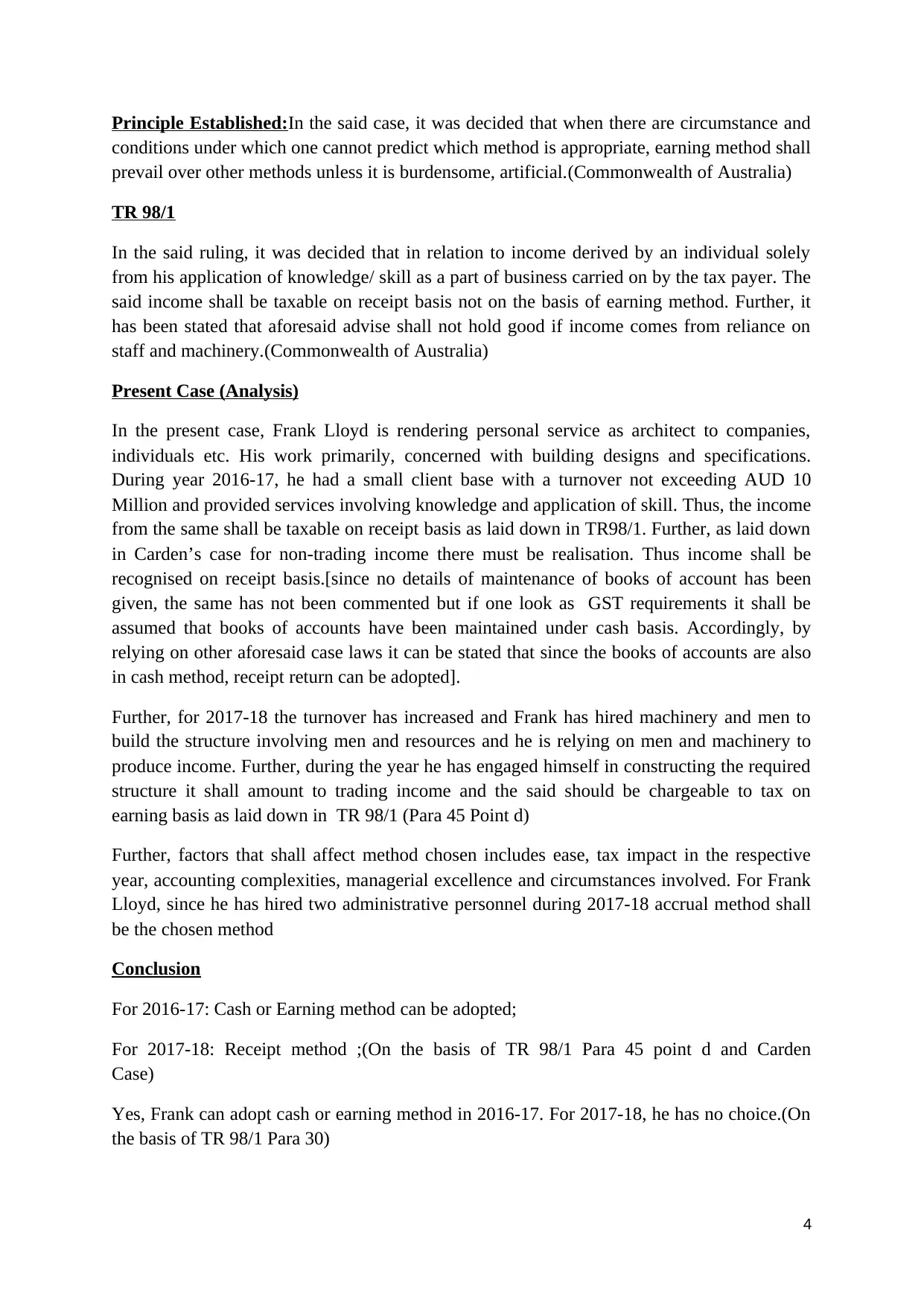
Principle Established:In the said case, it was decided that when there are circumstance and
conditions under which one cannot predict which method is appropriate, earning method shall
prevail over other methods unless it is burdensome, artificial.(Commonwealth of Australia)
TR 98/1
In the said ruling, it was decided that in relation to income derived by an individual solely
from his application of knowledge/ skill as a part of business carried on by the tax payer. The
said income shall be taxable on receipt basis not on the basis of earning method. Further, it
has been stated that aforesaid advise shall not hold good if income comes from reliance on
staff and machinery.(Commonwealth of Australia)
Present Case (Analysis)
In the present case, Frank Lloyd is rendering personal service as architect to companies,
individuals etc. His work primarily, concerned with building designs and specifications.
During year 2016-17, he had a small client base with a turnover not exceeding AUD 10
Million and provided services involving knowledge and application of skill. Thus, the income
from the same shall be taxable on receipt basis as laid down in TR98/1. Further, as laid down
in Carden’s case for non-trading income there must be realisation. Thus income shall be
recognised on receipt basis.[since no details of maintenance of books of account has been
given, the same has not been commented but if one look as GST requirements it shall be
assumed that books of accounts have been maintained under cash basis. Accordingly, by
relying on other aforesaid case laws it can be stated that since the books of accounts are also
in cash method, receipt return can be adopted].
Further, for 2017-18 the turnover has increased and Frank has hired machinery and men to
build the structure involving men and resources and he is relying on men and machinery to
produce income. Further, during the year he has engaged himself in constructing the required
structure it shall amount to trading income and the said should be chargeable to tax on
earning basis as laid down in TR 98/1 (Para 45 Point d)
Further, factors that shall affect method chosen includes ease, tax impact in the respective
year, accounting complexities, managerial excellence and circumstances involved. For Frank
Lloyd, since he has hired two administrative personnel during 2017-18 accrual method shall
be the chosen method
Conclusion
For 2016-17: Cash or Earning method can be adopted;
For 2017-18: Receipt method ;(On the basis of TR 98/1 Para 45 point d and Carden
Case)
Yes, Frank can adopt cash or earning method in 2016-17. For 2017-18, he has no choice.(On
the basis of TR 98/1 Para 30)
4
conditions under which one cannot predict which method is appropriate, earning method shall
prevail over other methods unless it is burdensome, artificial.(Commonwealth of Australia)
TR 98/1
In the said ruling, it was decided that in relation to income derived by an individual solely
from his application of knowledge/ skill as a part of business carried on by the tax payer. The
said income shall be taxable on receipt basis not on the basis of earning method. Further, it
has been stated that aforesaid advise shall not hold good if income comes from reliance on
staff and machinery.(Commonwealth of Australia)
Present Case (Analysis)
In the present case, Frank Lloyd is rendering personal service as architect to companies,
individuals etc. His work primarily, concerned with building designs and specifications.
During year 2016-17, he had a small client base with a turnover not exceeding AUD 10
Million and provided services involving knowledge and application of skill. Thus, the income
from the same shall be taxable on receipt basis as laid down in TR98/1. Further, as laid down
in Carden’s case for non-trading income there must be realisation. Thus income shall be
recognised on receipt basis.[since no details of maintenance of books of account has been
given, the same has not been commented but if one look as GST requirements it shall be
assumed that books of accounts have been maintained under cash basis. Accordingly, by
relying on other aforesaid case laws it can be stated that since the books of accounts are also
in cash method, receipt return can be adopted].
Further, for 2017-18 the turnover has increased and Frank has hired machinery and men to
build the structure involving men and resources and he is relying on men and machinery to
produce income. Further, during the year he has engaged himself in constructing the required
structure it shall amount to trading income and the said should be chargeable to tax on
earning basis as laid down in TR 98/1 (Para 45 Point d)
Further, factors that shall affect method chosen includes ease, tax impact in the respective
year, accounting complexities, managerial excellence and circumstances involved. For Frank
Lloyd, since he has hired two administrative personnel during 2017-18 accrual method shall
be the chosen method
Conclusion
For 2016-17: Cash or Earning method can be adopted;
For 2017-18: Receipt method ;(On the basis of TR 98/1 Para 45 point d and Carden
Case)
Yes, Frank can adopt cash or earning method in 2016-17. For 2017-18, he has no choice.(On
the basis of TR 98/1 Para 30)
4
Paraphrase This Document
Need a fresh take? Get an instant paraphrase of this document with our AI Paraphraser
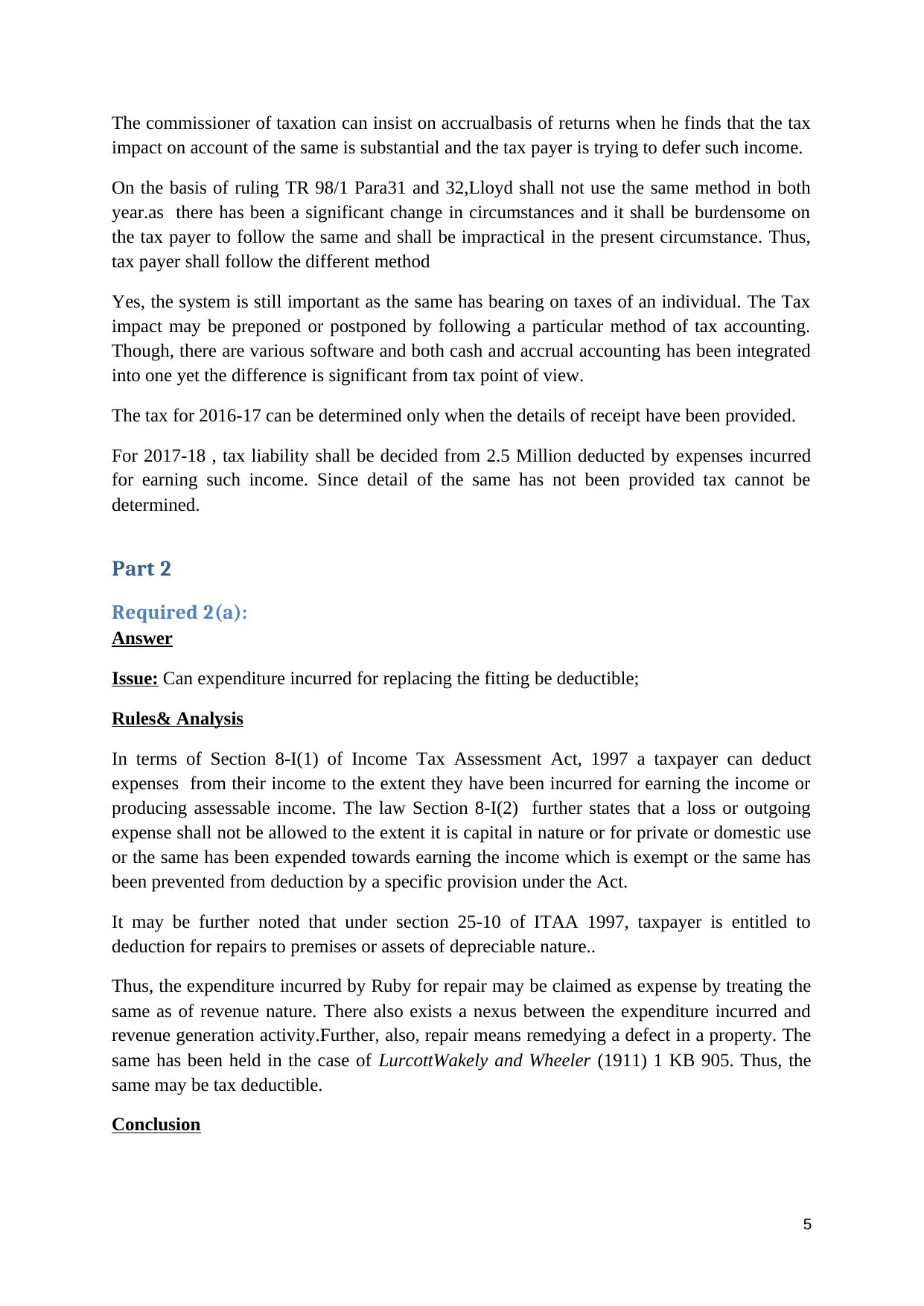
The commissioner of taxation can insist on accrualbasis of returns when he finds that the tax
impact on account of the same is substantial and the tax payer is trying to defer such income.
On the basis of ruling TR 98/1 Para31 and 32,Lloyd shall not use the same method in both
year.as there has been a significant change in circumstances and it shall be burdensome on
the tax payer to follow the same and shall be impractical in the present circumstance. Thus,
tax payer shall follow the different method
Yes, the system is still important as the same has bearing on taxes of an individual. The Tax
impact may be preponed or postponed by following a particular method of tax accounting.
Though, there are various software and both cash and accrual accounting has been integrated
into one yet the difference is significant from tax point of view.
The tax for 2016-17 can be determined only when the details of receipt have been provided.
For 2017-18 , tax liability shall be decided from 2.5 Million deducted by expenses incurred
for earning such income. Since detail of the same has not been provided tax cannot be
determined.
Part 2
Required 2(a):
Answer
Issue: Can expenditure incurred for replacing the fitting be deductible;
Rules& Analysis
In terms of Section 8-I(1) of Income Tax Assessment Act, 1997 a taxpayer can deduct
expenses from their income to the extent they have been incurred for earning the income or
producing assessable income. The law Section 8-I(2) further states that a loss or outgoing
expense shall not be allowed to the extent it is capital in nature or for private or domestic use
or the same has been expended towards earning the income which is exempt or the same has
been prevented from deduction by a specific provision under the Act.
It may be further noted that under section 25-10 of ITAA 1997, taxpayer is entitled to
deduction for repairs to premises or assets of depreciable nature..
Thus, the expenditure incurred by Ruby for repair may be claimed as expense by treating the
same as of revenue nature. There also exists a nexus between the expenditure incurred and
revenue generation activity.Further, also, repair means remedying a defect in a property. The
same has been held in the case of LurcottWakely and Wheeler (1911) 1 KB 905. Thus, the
same may be tax deductible.
Conclusion
5
impact on account of the same is substantial and the tax payer is trying to defer such income.
On the basis of ruling TR 98/1 Para31 and 32,Lloyd shall not use the same method in both
year.as there has been a significant change in circumstances and it shall be burdensome on
the tax payer to follow the same and shall be impractical in the present circumstance. Thus,
tax payer shall follow the different method
Yes, the system is still important as the same has bearing on taxes of an individual. The Tax
impact may be preponed or postponed by following a particular method of tax accounting.
Though, there are various software and both cash and accrual accounting has been integrated
into one yet the difference is significant from tax point of view.
The tax for 2016-17 can be determined only when the details of receipt have been provided.
For 2017-18 , tax liability shall be decided from 2.5 Million deducted by expenses incurred
for earning such income. Since detail of the same has not been provided tax cannot be
determined.
Part 2
Required 2(a):
Answer
Issue: Can expenditure incurred for replacing the fitting be deductible;
Rules& Analysis
In terms of Section 8-I(1) of Income Tax Assessment Act, 1997 a taxpayer can deduct
expenses from their income to the extent they have been incurred for earning the income or
producing assessable income. The law Section 8-I(2) further states that a loss or outgoing
expense shall not be allowed to the extent it is capital in nature or for private or domestic use
or the same has been expended towards earning the income which is exempt or the same has
been prevented from deduction by a specific provision under the Act.
It may be further noted that under section 25-10 of ITAA 1997, taxpayer is entitled to
deduction for repairs to premises or assets of depreciable nature..
Thus, the expenditure incurred by Ruby for repair may be claimed as expense by treating the
same as of revenue nature. There also exists a nexus between the expenditure incurred and
revenue generation activity.Further, also, repair means remedying a defect in a property. The
same has been held in the case of LurcottWakely and Wheeler (1911) 1 KB 905. Thus, the
same may be tax deductible.
Conclusion
5
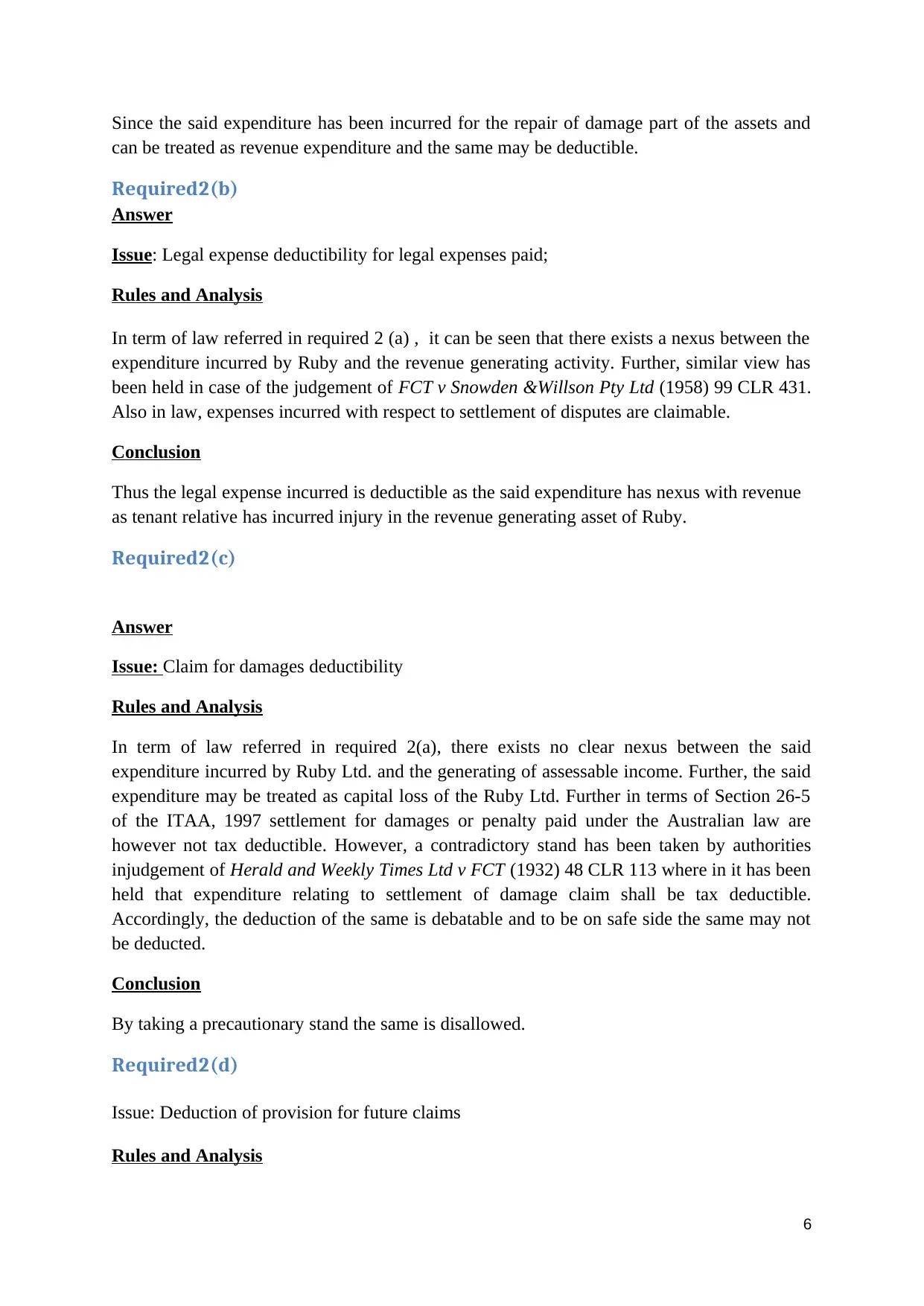
Since the said expenditure has been incurred for the repair of damage part of the assets and
can be treated as revenue expenditure and the same may be deductible.
Required2(b)
Answer
Issue: Legal expense deductibility for legal expenses paid;
Rules and Analysis
In term of law referred in required 2 (a) , it can be seen that there exists a nexus between the
expenditure incurred by Ruby and the revenue generating activity. Further, similar view has
been held in case of the judgement of FCT v Snowden &Willson Pty Ltd (1958) 99 CLR 431.
Also in law, expenses incurred with respect to settlement of disputes are claimable.
Conclusion
Thus the legal expense incurred is deductible as the said expenditure has nexus with revenue
as tenant relative has incurred injury in the revenue generating asset of Ruby.
Required2(c)
Answer
Issue: Claim for damages deductibility
Rules and Analysis
In term of law referred in required 2(a), there exists no clear nexus between the said
expenditure incurred by Ruby Ltd. and the generating of assessable income. Further, the said
expenditure may be treated as capital loss of the Ruby Ltd. Further in terms of Section 26-5
of the ITAA, 1997 settlement for damages or penalty paid under the Australian law are
however not tax deductible. However, a contradictory stand has been taken by authorities
injudgement of Herald and Weekly Times Ltd v FCT (1932) 48 CLR 113 where in it has been
held that expenditure relating to settlement of damage claim shall be tax deductible.
Accordingly, the deduction of the same is debatable and to be on safe side the same may not
be deducted.
Conclusion
By taking a precautionary stand the same is disallowed.
Required2(d)
Issue: Deduction of provision for future claims
Rules and Analysis
6
can be treated as revenue expenditure and the same may be deductible.
Required2(b)
Answer
Issue: Legal expense deductibility for legal expenses paid;
Rules and Analysis
In term of law referred in required 2 (a) , it can be seen that there exists a nexus between the
expenditure incurred by Ruby and the revenue generating activity. Further, similar view has
been held in case of the judgement of FCT v Snowden &Willson Pty Ltd (1958) 99 CLR 431.
Also in law, expenses incurred with respect to settlement of disputes are claimable.
Conclusion
Thus the legal expense incurred is deductible as the said expenditure has nexus with revenue
as tenant relative has incurred injury in the revenue generating asset of Ruby.
Required2(c)
Answer
Issue: Claim for damages deductibility
Rules and Analysis
In term of law referred in required 2(a), there exists no clear nexus between the said
expenditure incurred by Ruby Ltd. and the generating of assessable income. Further, the said
expenditure may be treated as capital loss of the Ruby Ltd. Further in terms of Section 26-5
of the ITAA, 1997 settlement for damages or penalty paid under the Australian law are
however not tax deductible. However, a contradictory stand has been taken by authorities
injudgement of Herald and Weekly Times Ltd v FCT (1932) 48 CLR 113 where in it has been
held that expenditure relating to settlement of damage claim shall be tax deductible.
Accordingly, the deduction of the same is debatable and to be on safe side the same may not
be deducted.
Conclusion
By taking a precautionary stand the same is disallowed.
Required2(d)
Issue: Deduction of provision for future claims
Rules and Analysis
6
⊘ This is a preview!⊘
Do you want full access?
Subscribe today to unlock all pages.

Trusted by 1+ million students worldwide
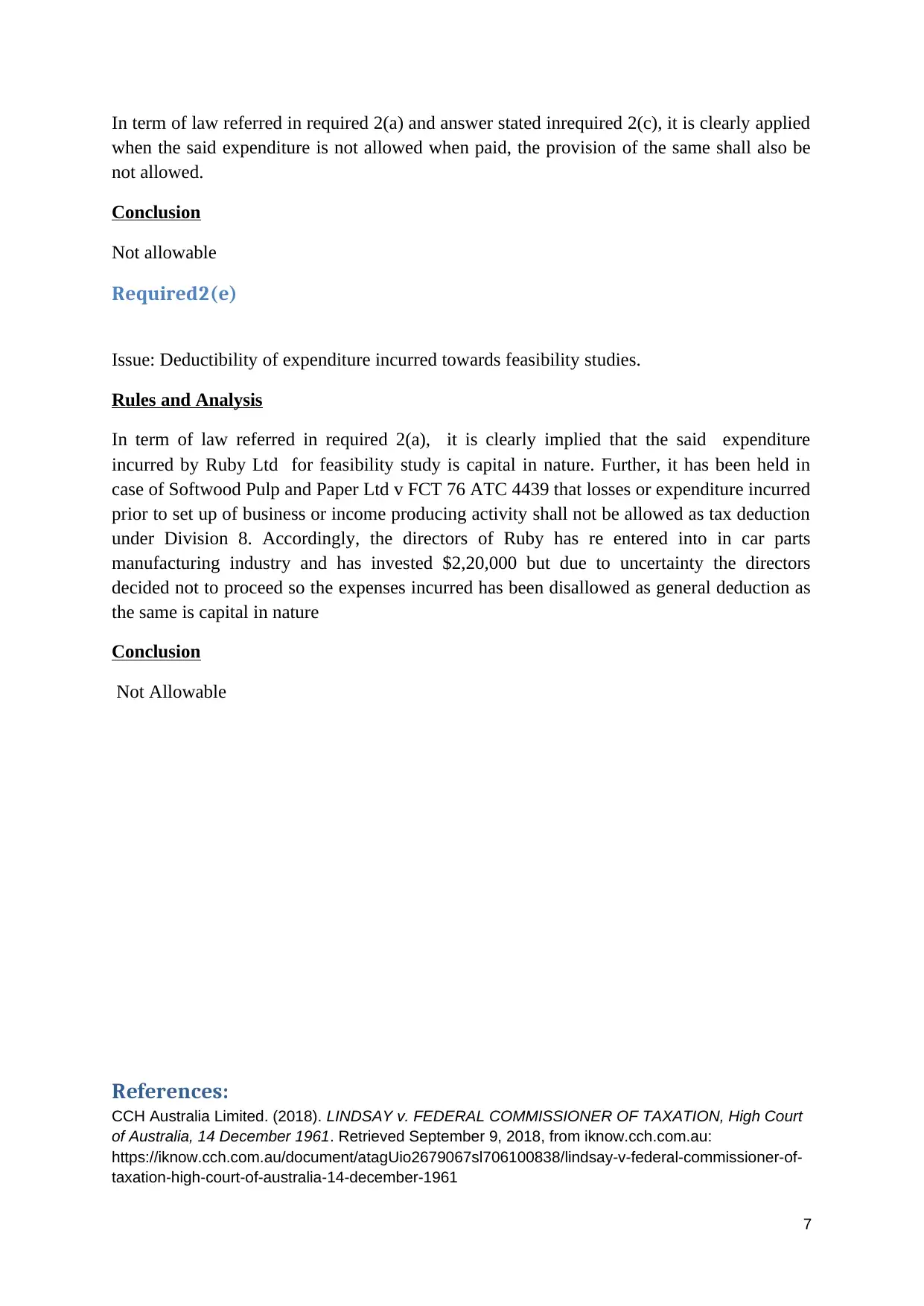
In term of law referred in required 2(a) and answer stated inrequired 2(c), it is clearly applied
when the said expenditure is not allowed when paid, the provision of the same shall also be
not allowed.
Conclusion
Not allowable
Required2(e)
Issue: Deductibility of expenditure incurred towards feasibility studies.
Rules and Analysis
In term of law referred in required 2(a), it is clearly implied that the said expenditure
incurred by Ruby Ltd for feasibility study is capital in nature. Further, it has been held in
case of Softwood Pulp and Paper Ltd v FCT 76 ATC 4439 that losses or expenditure incurred
prior to set up of business or income producing activity shall not be allowed as tax deduction
under Division 8. Accordingly, the directors of Ruby has re entered into in car parts
manufacturing industry and has invested $2,20,000 but due to uncertainty the directors
decided not to proceed so the expenses incurred has been disallowed as general deduction as
the same is capital in nature
Conclusion
Not Allowable
References:
CCH Australia Limited. (2018). LINDSAY v. FEDERAL COMMISSIONER OF TAXATION, High Court
of Australia, 14 December 1961. Retrieved September 9, 2018, from iknow.cch.com.au:
https://iknow.cch.com.au/document/atagUio2679067sl706100838/lindsay-v-federal-commissioner-of-
taxation-high-court-of-australia-14-december-1961
7
when the said expenditure is not allowed when paid, the provision of the same shall also be
not allowed.
Conclusion
Not allowable
Required2(e)
Issue: Deductibility of expenditure incurred towards feasibility studies.
Rules and Analysis
In term of law referred in required 2(a), it is clearly implied that the said expenditure
incurred by Ruby Ltd for feasibility study is capital in nature. Further, it has been held in
case of Softwood Pulp and Paper Ltd v FCT 76 ATC 4439 that losses or expenditure incurred
prior to set up of business or income producing activity shall not be allowed as tax deduction
under Division 8. Accordingly, the directors of Ruby has re entered into in car parts
manufacturing industry and has invested $2,20,000 but due to uncertainty the directors
decided not to proceed so the expenses incurred has been disallowed as general deduction as
the same is capital in nature
Conclusion
Not Allowable
References:
CCH Australia Limited. (2018). LINDSAY v. FEDERAL COMMISSIONER OF TAXATION, High Court
of Australia, 14 December 1961. Retrieved September 9, 2018, from iknow.cch.com.au:
https://iknow.cch.com.au/document/atagUio2679067sl706100838/lindsay-v-federal-commissioner-of-
taxation-high-court-of-australia-14-december-1961
7
Paraphrase This Document
Need a fresh take? Get an instant paraphrase of this document with our AI Paraphraser
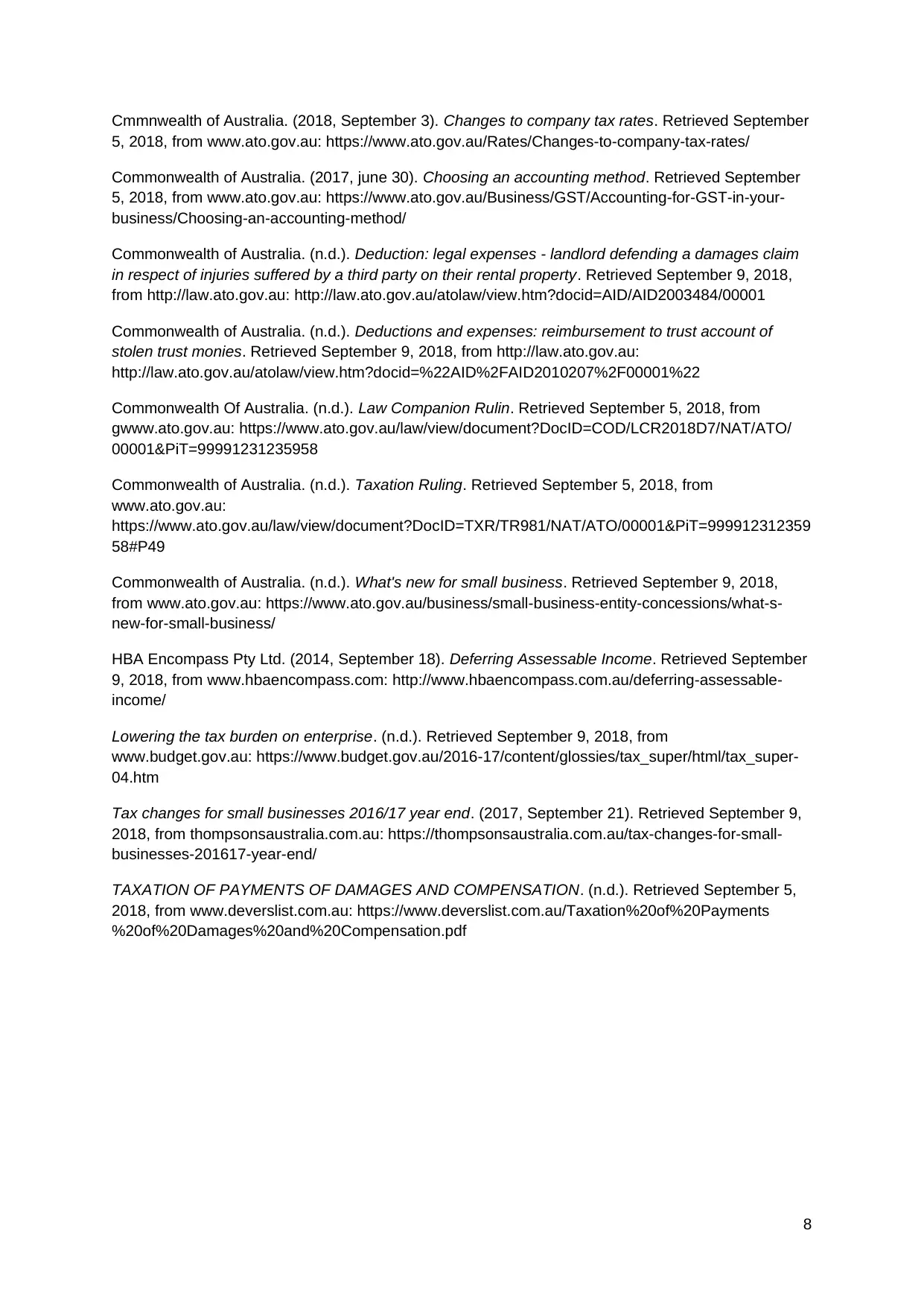
Cmmnwealth of Australia. (2018, September 3). Changes to company tax rates. Retrieved September
5, 2018, from www.ato.gov.au: https://www.ato.gov.au/Rates/Changes-to-company-tax-rates/
Commonwealth of Australia. (2017, june 30). Choosing an accounting method. Retrieved September
5, 2018, from www.ato.gov.au: https://www.ato.gov.au/Business/GST/Accounting-for-GST-in-your-
business/Choosing-an-accounting-method/
Commonwealth of Australia. (n.d.). Deduction: legal expenses - landlord defending a damages claim
in respect of injuries suffered by a third party on their rental property. Retrieved September 9, 2018,
from http://law.ato.gov.au: http://law.ato.gov.au/atolaw/view.htm?docid=AID/AID2003484/00001
Commonwealth of Australia. (n.d.). Deductions and expenses: reimbursement to trust account of
stolen trust monies. Retrieved September 9, 2018, from http://law.ato.gov.au:
http://law.ato.gov.au/atolaw/view.htm?docid=%22AID%2FAID2010207%2F00001%22
Commonwealth Of Australia. (n.d.). Law Companion Rulin. Retrieved September 5, 2018, from
gwww.ato.gov.au: https://www.ato.gov.au/law/view/document?DocID=COD/LCR2018D7/NAT/ATO/
00001&PiT=99991231235958
Commonwealth of Australia. (n.d.). Taxation Ruling. Retrieved September 5, 2018, from
www.ato.gov.au:
https://www.ato.gov.au/law/view/document?DocID=TXR/TR981/NAT/ATO/00001&PiT=999912312359
58#P49
Commonwealth of Australia. (n.d.). What's new for small business. Retrieved September 9, 2018,
from www.ato.gov.au: https://www.ato.gov.au/business/small-business-entity-concessions/what-s-
new-for-small-business/
HBA Encompass Pty Ltd. (2014, September 18). Deferring Assessable Income. Retrieved September
9, 2018, from www.hbaencompass.com: http://www.hbaencompass.com.au/deferring-assessable-
income/
Lowering the tax burden on enterprise. (n.d.). Retrieved September 9, 2018, from
www.budget.gov.au: https://www.budget.gov.au/2016-17/content/glossies/tax_super/html/tax_super-
04.htm
Tax changes for small businesses 2016/17 year end. (2017, September 21). Retrieved September 9,
2018, from thompsonsaustralia.com.au: https://thompsonsaustralia.com.au/tax-changes-for-small-
businesses-201617-year-end/
TAXATION OF PAYMENTS OF DAMAGES AND COMPENSATION. (n.d.). Retrieved September 5,
2018, from www.deverslist.com.au: https://www.deverslist.com.au/Taxation%20of%20Payments
%20of%20Damages%20and%20Compensation.pdf
8
5, 2018, from www.ato.gov.au: https://www.ato.gov.au/Rates/Changes-to-company-tax-rates/
Commonwealth of Australia. (2017, june 30). Choosing an accounting method. Retrieved September
5, 2018, from www.ato.gov.au: https://www.ato.gov.au/Business/GST/Accounting-for-GST-in-your-
business/Choosing-an-accounting-method/
Commonwealth of Australia. (n.d.). Deduction: legal expenses - landlord defending a damages claim
in respect of injuries suffered by a third party on their rental property. Retrieved September 9, 2018,
from http://law.ato.gov.au: http://law.ato.gov.au/atolaw/view.htm?docid=AID/AID2003484/00001
Commonwealth of Australia. (n.d.). Deductions and expenses: reimbursement to trust account of
stolen trust monies. Retrieved September 9, 2018, from http://law.ato.gov.au:
http://law.ato.gov.au/atolaw/view.htm?docid=%22AID%2FAID2010207%2F00001%22
Commonwealth Of Australia. (n.d.). Law Companion Rulin. Retrieved September 5, 2018, from
gwww.ato.gov.au: https://www.ato.gov.au/law/view/document?DocID=COD/LCR2018D7/NAT/ATO/
00001&PiT=99991231235958
Commonwealth of Australia. (n.d.). Taxation Ruling. Retrieved September 5, 2018, from
www.ato.gov.au:
https://www.ato.gov.au/law/view/document?DocID=TXR/TR981/NAT/ATO/00001&PiT=999912312359
58#P49
Commonwealth of Australia. (n.d.). What's new for small business. Retrieved September 9, 2018,
from www.ato.gov.au: https://www.ato.gov.au/business/small-business-entity-concessions/what-s-
new-for-small-business/
HBA Encompass Pty Ltd. (2014, September 18). Deferring Assessable Income. Retrieved September
9, 2018, from www.hbaencompass.com: http://www.hbaencompass.com.au/deferring-assessable-
income/
Lowering the tax burden on enterprise. (n.d.). Retrieved September 9, 2018, from
www.budget.gov.au: https://www.budget.gov.au/2016-17/content/glossies/tax_super/html/tax_super-
04.htm
Tax changes for small businesses 2016/17 year end. (2017, September 21). Retrieved September 9,
2018, from thompsonsaustralia.com.au: https://thompsonsaustralia.com.au/tax-changes-for-small-
businesses-201617-year-end/
TAXATION OF PAYMENTS OF DAMAGES AND COMPENSATION. (n.d.). Retrieved September 5,
2018, from www.deverslist.com.au: https://www.deverslist.com.au/Taxation%20of%20Payments
%20of%20Damages%20and%20Compensation.pdf
8
1 out of 8
Related Documents
Your All-in-One AI-Powered Toolkit for Academic Success.
+13062052269
info@desklib.com
Available 24*7 on WhatsApp / Email
![[object Object]](/_next/static/media/star-bottom.7253800d.svg)
Unlock your academic potential
Copyright © 2020–2026 A2Z Services. All Rights Reserved. Developed and managed by ZUCOL.





